Learning and knowledge sharing are fundamental to the LHSS Project. We invite you to search LHSS knowledge products and resources for the latest approaches, insights, and learning in the field of integrated health systems strengthening.
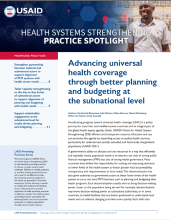
This brief discusses promising practices for working with government and non-government stakeholders to strengthen health planning and budgeting at the subnational level. The practices also highlight why and how to put subnational level actors at the forefront of any reforms to improve health outcomes through resource optimization.
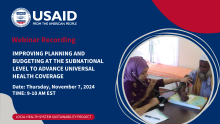
In this webinar, representatives from Tanzania and Timor-Leste, along with WHO and LHSS panelists, discussed strategies for strengthening subnational public financial management systems to align with health sector needs, enhance partnerships, and improve community resource efficiency.
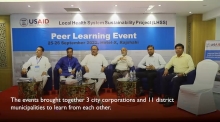
The video showcases the success of peer learning events held in the Sylhet and Rajshahi regions, where city corporations and district municipalities came together to share experiences and discuss different approaches to strengthening primary health care.
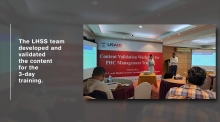
This video highlights the collaborative efforts between LHSS and six district municipalities from Sylhet and Rajshahi divisions to strengthen primary health care systems in urban Bangladesh.
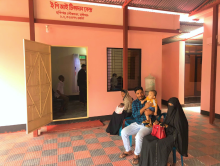
In a municipality where over 100,000 people had no access to basic health services, stakeholders joined together to open a primary health center that now serves thousands of households.
This workshop marks a significant step towards enhancing health care in urban Bangladesh by uniting the Local Government Division, 11 municipalities, and 3 city corporations in a shared commitment to improve access and effectiveness of primary health care delivery.
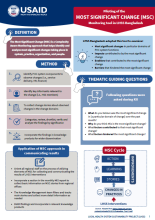
The Most Significant Change (MSC) is a complexity-aware monitoring approach that helps us track and understand important changes happening in systems, practices, organizations, and people. LHSS Bangladesh has applied this MSC tool to identify, evaluate, and understand the most substantial changes within our primary health care system functions.
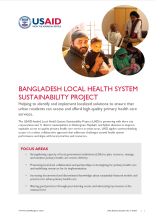
LHSS Bnagladesh is helping to identify and implement localized solutions to ensure that urban residents can access and afford high-quality primary health care services.
The Local Government Division and LHSS organized a workshop on primary health care plans in Sylhet. This workshop sought to foster collaboration, knowledge exchange, and resource mobilization for the successful implementation of primary health care implementation plans within the urban areas of the country.
This learning brief captures LHSS’s experience in supporting municipal-level partners through the contracting process and distills emerging lessons to inspire other municipalities to pursue public-private partnerships as a vehicle for expanding access to urban PHC services.
This brief presents what LHSS has learned through applying a systems thinking approach to its support for HSCs’ advocacy efforts in expanding PHC services in urban Bangladesh.
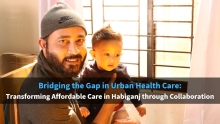
USAID Local Health System Sustainability Project (LHSS) in Bangladesh works with 14 local government institutions (LGIs) to improve primary health care for urban poor! Watch how LHSS helped Habiganj Municipality to transform an abandoned building into a fully functional primary health care center, serving over 100,000 people in need!
New efforts will make health care more affordable for residents in 10 municipalities.

LHSS is supporting local government institutions in Bangladesh’s densely populated Rajshahi and Sylhet Divisions to expand access to primary health services and reduce out-of-pocket expenditures for low-income urban residents.
This brief highlights learnings from working with local government leaders of two city corporations and ten district-level municipalities from the Rajshahi and Sylhet divisions in Bangladesh.
